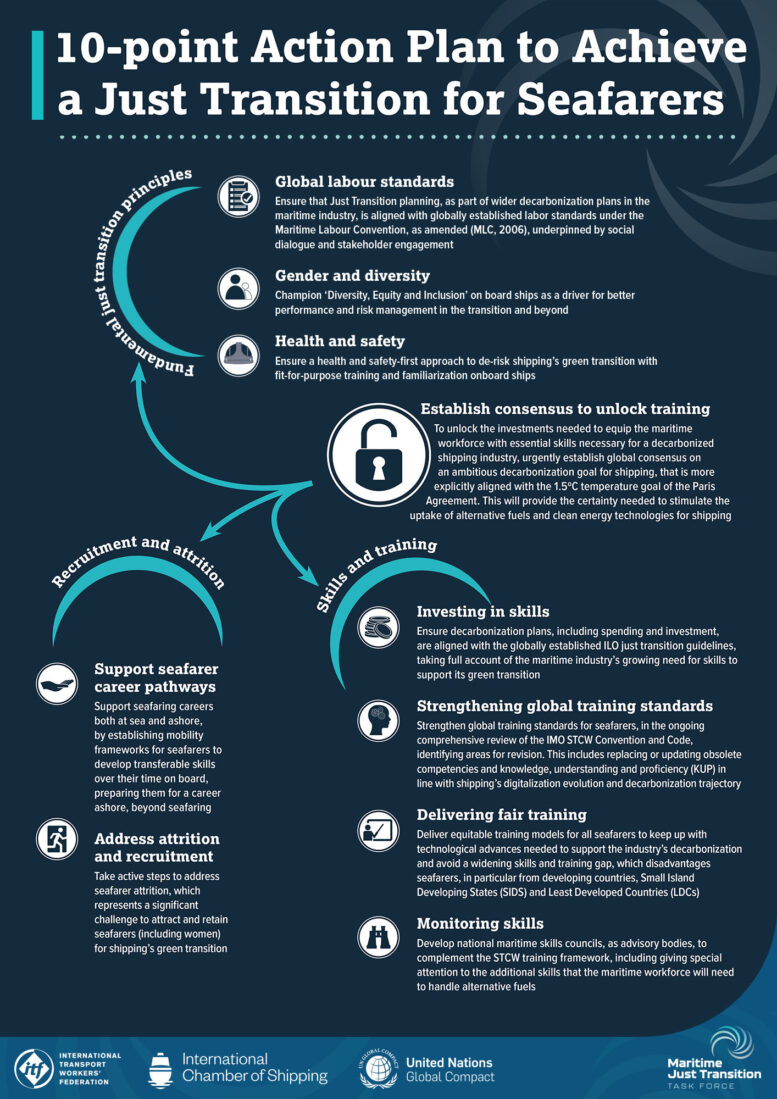An estimated 800,000 seafarers will require additional training by the mid-2030s to enable the shipping industry to transition towards alternative low carbon fuels or zero-carbon fuels and green technologies. The goal is to keep global warming to 1.5C or less by 2050, according to a DNV Study commissioned by the Maritime Just Transition Task Force Secretariat.
Findings also point to the uncertainty of alternative fuel options which is causing knock-on effects on seafarer training. In its general conclusions, the report notes a lack of clarity, viability, and uptake of alternative fuels, and uncertainty over regulatory developments and finance, the confluence of which make it difficult to plan further training for seafarers. Once there is more certainty on the trajectory of the green fuel transition, it will be easier to train the seafarers.
DNV’s study looked at three decarbonization forecast scenarios. The research modelled these scenarios based on the 50% Emission Reduction by 2050; Zero Carbon by 2050; and Decarbonization by 2050.
The first scenario is based on IMO’s original 2018 target of 50% Greenhouse Gas (GHG) Emission Reduction by 2050 that would require training of up to 300,000 seafarers to be able to work with green fuels by then.
The second scenario is the Zero Carbon by 2050 that modelled Lloyds Register and University Maritime Advisory Services (UMAS). It foresees 450,000 seafarers would require additional training by 2030.
The third scenario which aims for full industry-wide Decarbonization by 2050, will require additional seafarer training, involving an additional 800,000 seafarers by the mid-2030s who will handle alternative fuel mixes by then.
Under all three scenarios, there is an immediate need to start building the seafarer training infrastructure in place. Nearly 2 million seafarers will need to be upskilled through the green transition process. Otherwise, a skills gap will hit the maritime workers in the mid-2030s.
In response to the DNV report findings – that each of the three different scenarios for maritime emissions reduction would require thousands of seafarers to receive additional training – the Maritime Just Transition Task Force has put together a 10-point Action Plan at COP27 with practical recommendations for the shipping industry, governments, workers, and academics.
The Action Plan makes recommendations for industry, governments, seafarer unions, academia, and training providers in terms of meeting the challenge of training for alternative fuels. The recommendations are:
- Strengthening global training standards;
- Ensuring a health-and-safety-first approach; and
- Establishing advisory national maritime skills councils.
The recommendations of the Action Plan call for strengthening training standards by overhauling STCW, and are thus set to upskill seafarers to meet the maritime decarbonization objectives. They are also to advise and oversee training and best green practices.
Are the seafarers in agreement to take on this challenge? “The good news is that seafarers are prepared and willing to be part of this transition. But crew want to know that the fuels they’re handling are indeed safe, and that we as an industry have the training pathways established to upgrade their skills,” said Stephen Cotton, General Secretary, International Transport Workers’ Federation (ITF).
National governments can revise and/or establish standards and training requirements for alternative fuel types through amendments to the STCW Convention at the International Maritime Organization. The Task Force aims to ensure seafarers who are the workers at the frontline of decarbonization are properly looked after and trained for the shipping sector’s energy transition. The making of reskilled, upskilled, and new green skilled seafarers will need to be a collaborative effort by all stakeholders.
The research was undertaken to ensure that the shipping sector’s response to the climate emergency puts seafarers and communities at the heart of the solution.
As such, maritime safety was likewise stressed by DNV Maritime CEO, Knut Ørbeck-Nilssen. ”Decarbonization is bringing new opportunities, new technologies but also new risks. Our first priority must be to achieve safe decarbonization. We must take a collaborative approach to safeguard our people, our ships, and our environment,” he said.
